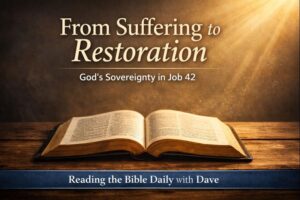⏱️ Estimated Reading Time: 7 min read
 The writer of Hebrews places great stock in the use of historical examples. For example, in chapter 11, he makes make a tour de force through biblical history but in the last verses of chapter 10, he turns back to the history of the particular congregation to whom he is writing his letter. So we can see that for the writer of Hebrews, understanding history is important.
The writer of Hebrews places great stock in the use of historical examples. For example, in chapter 11, he makes make a tour de force through biblical history but in the last verses of chapter 10, he turns back to the history of the particular congregation to whom he is writing his letter. So we can see that for the writer of Hebrews, understanding history is important.
Ours is a generation that foolishly thinks history is irrelevant. This is partly because we are self-centered, so we don’t really care about anyone but ourselves. Many Christians are shaped in their thinking by secular ideas of progress resulting in the belief that events which took place before our own time are necessarily inferior. C.S. Lewis labels this phenomenon “chronological snobbery.” But the writer of Hebrews thought the past was an important resource for the present. Hebrews 10:32 uses the important word remember, also translated recall – “But recall the former days when, after you were enlightened, you endured a hard struggle with sufferings.”
The first thing we should notice is that the author does not “recall” his readers’ attention to the good old days where faith seemed easy. It is not the times when things go well that really define our Christian lives. The really significant times, the periods that make up the highlights of our own histories are quite often those of trial, difficulty and danger.
This tells us something about how we should approach trials when they come. Things happen, circumstances suddenly change, a great problem arises, and we think something terrible has occurred. From one perspective it is natural to think this way in the face of sickness or job loss, the death of a loved one, or the sudden loss of a key leader. Nobody looks forward to such things. Hebrews 10:32 reminds us these are the occasions that make us rise up in our faith and that provide development of godly character. It is when supports are stripped away that we find out what our faith is really made of. In this sense, we should view trials as opportunities to glorify the Lord and as positive challenges to bring out and display our faith in God.
The events in our lives we will most remember are the times of difficulty when God proved Himself to our faith. These are the things our children will remember from their childhood. Whenever we face real trouble we should endeavor to mine out treasures for the future, which is just what the writer of Hebrews does. He wants his readers to remember what Christians can do through faith, what they had been able to do in an earlier period of trial, and how God’s grace is sufficient for those who look to him in those very times of trouble.
Hebrews 10:32-34 declares “But recall the former days when, after you were enlightened, you endured a hard struggle with sufferings, sometimes being publicly exposed to reproach and affliction, and sometimes being partners with those so treated. For you had compassion on those in prison, and you joyfully accepted the plundering of your property, since you knew that you yourselves had a better possession and an abiding one.” Notice the kinds of things God carried the Christians through by the power they received through simple faith in Him. There was “a hard struggle” characterized by suffering. What is it that Christians fear about suffering? Most of all we fear we will give in and that our faith will fail. But these Christians learned of God’s sustaining grace. Having faced a hard struggle, Hebrews 10:32 says, “You endured.”
In their earlier trial, the recipients of the letter had been subjected to “reproach and affliction.” This is the kind of thing that Christians in the West may soon experience. We worry that in response to insult and persecution we might deny our faith or that we might be afraid to let people know we are Christians. But God enabled these believers to do the opposite, “being partners with those so treated” (Hebrews 10:33). To this the writer adds that some were put into prison and many had their property confiscated. By faith his readers ministered to those afflicted and even accepted their own losses with joy. A hallmark of the early church was not merely that they endured affliction, but they exhibited joy throughout it all. True faith requires that if we are not willing to endure affliction, then we simply cannot be Christians. Jesus noted in Luke 9:23-24, “If anyone would come after me, let him deny himself and take up his cross daily and follow me. For whoever would save his life will lose it, but whoever loses his life for my sake will save it.”
We should also be reminded of Peter and John during the early days after the resurrection. The Sanhedrin hauled them in and demanded they stopped preaching the gospel in the city of Jerusalem. To drive the lesson home, they had the apostles savagely flogged. Luke’s description of this event in Acts 5:41 is all the more powerful due to its brevity – “Then they left the presence of the council, rejoicing that they were counted worthy to suffer dishonor for the name.”
This is an example of what true faith can do in the life of the believer. Moreover, the lesson we can draw from these examples, one which the writer from Hebrews also notes, is that suffering produces endurance which produces faith. Speaking of their confiscated property, the writer of Hebrews says, “You ourselves had a better possession and an abiding one” (Hebrews 10:34). He might have written similarly about the threat of death, “You knew you had a better and lasting life.” He might have said this about suffering, pointing to a “better and lasting comfort,” and similarly about disgrace, since everyone who holds to faith in Christ has no less than eternal glory waiting in store for them. This was Paul’s perspective when he wrote in Romans 8:18, “For I consider that the sufferings of this present time are not worth comparing with the glory that is to be revealed to us.”
Hebrews 10:32-34 reveals the goal of Christians in trials is that we stand firm. “You have endured”, the author says, with reference to the past. “Do not shrink back,” he warns as he turns to the present. This is exactly what we are to do in our day and age. Christians do not have to win the culture war, nor should we expect worldly triumphs. Our first goal is always to be true to the faith in this hostile world, standing on the solid rock of Christ.
The writer of Hebrews challenges the reader to remember what their forebears in the faith had done through their faith in God’s sovereignty. No doubt it was by remembering that their predecessors withstood their trials. The anti-Christian forces employed insult and persecution against them. In those times, they remembered Jesus and the ridicule He received on the cross. They overcame their fear of suffering with a greater fear, that of the very thought they might fail to have fellowship in Christ’s sufferings. This is the logic the world cannot understand, the very reason Jesus took up the cross and that causes Christians to meet with him there.
This readiness to share in suffering has always confounded tyrants who tried to suppress the Christian faith. They put Christians in prison to isolate them, but other Christians just came to prison to keep them company. They confiscated believers’ homes and possessions, seeking to break their spirits. In the end, it was the spirit of the persecutors of God’s people that was shattered when the Christians responded with sacrificial sharing to provide for those in need. This was the testimony of the wonderful Christian congregation in suffering, to whom the writer of Hebrews was addressing his admonition. This was the display of faith by which Christians turned the ancient world upside down. In the words of the Puritan author Jeremiah Burroughs, a man also familiar with persecution, “When a Christian can walk in the mist of fiery trials, without his garments being singed, and has comfort and joy in the midst of everything. It will convince men, when they see the power of grace in the mist of afflictions.”



